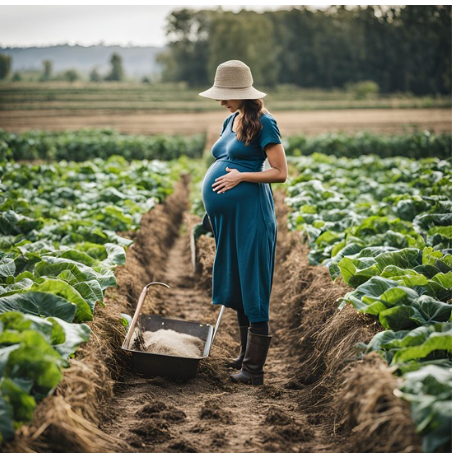
Understanding Your Farm’s Needs
Before you can find someone to farm sit or before you can get an emergency caretaker, you must first create some sort of list for whomever will be taking over for you, while you are away. You may want to start your day with a pen and paper and write down each task you do. You may surprise yourself on how much stuff you might have forgotten and how LONG that list becomes. Consider the following aspects:
Preparing Your Farm for Your Hospital Stay: A Guide for Expectant Mothers
As an expectant mother who also happens to manage a farm, preparing for the arrival of your baby involves more than just packing a hospital bag and choosing a name! You will also need to ensure that your farm will be well-taken care of during your absence. Whether you’re preparing for a routine delivery or anticipating the unexpected, having a plan in place for your farm is crucial. Here’s a comprehensive guide to help you navigate this important aspect of your journey into motherhood.
- Livestock: Do you have animals that need feeding, watering, and possibly milking or egg collecting? Make a list of each animal’s needs and feeding schedule.
- Crops and Gardens: Are there specific watering schedules, pest control measures, or harvesting needs that must be attended to regularly?
- Equipment Maintenance: Are there any ongoing repairs or maintenance tasks that need to be monitored or completed? Do you have a fence area, for example, that tends to fail at unexpected times? You may want your farm sitter to check on that fence at each visit.
- Emergency Supplies: Do you have backup supplies of feed, medication, and other essentials in case of unexpected situations?
- Unexpected or Chronic Tasks: You may have an animal that may have an ongoing issue that pops up from time to time or maybe there is a persistent problem like a returning fox, that you can’t seem to catch in the act. Make sure you add to your list, ways for the sitter to check on and mitigate these sort of problems.
Planning for Your Hospital Stay
Step 1: Identify Potential Caretakers
Ideally, you should have a primary and a backup caretaker identified and prepared well in advance of your due date. Here’s how to go about finding them:
- Family and Friends: Start by asking trustworthy family members or friends who are familiar with your farm routine.
- Neighbors: Consider neighbors who are experienced with farming or who may have helped out in the past.
- Professional Farm Sitters: There are services available that specialize in farm sitting. They often have experience with various types of livestock and farming operations.
Step 2: Communicate Expectations Clearly
Once you’ve identified your potential caretakers, it’s crucial to sit down with them and go over the details of your farm’s daily operations. Here are some key points to cover:
- Daily Tasks: Provide a detailed schedule of feeding times, watering needs, and any specific tasks that need attention.
- Emergency Protocols: Outline what should be done in case of an emergency, such as contacting a veterinarian or handling a sudden equipment failure.
- Contact Information: Give them a list of important contacts, including your veterinarian, neighbors who can assist in emergencies, and how to reach you or your partner at the hospital.
- Another Consideration: While you may find someone who is reliable, things still happen. Consider having a backup person who can take care of things if something happens to your primary sitter. It will be MUCH harder to get someone else set up, if you are in the hospital.
Step 3: Trial Run
If possible, arrange for a trial period where your chosen caretaker(s) can spend a day or two shadowing you on the farm. This hands-on experience will give them a better understanding of your routines and any nuances they need to be aware of.
Step 4: Prepare Your Farm
- Stock Up: Ensure you have enough feed, medications, and other supplies to last through your hospital stay and a few extra days in case of unexpected delays.
- Secure Perimeters: Double-check all fences, gates, and enclosures to prevent any potential escapes or unauthorized access.
- Document Everything: Create a comprehensive document or checklist detailing all necessary tasks and information. Include feeding instructions, medication dosages (if applicable), and any special care instructions.
Final Preparations Before You Go
As your due date approaches, there are a few final preparations you’ll need to make to ensure a smooth transition:
- Emergency Fund: Have an emergency fund set aside for unexpected expenses related to your farm while you’re away.
- Legal Considerations: Consider drafting a simple agreement or contract outlining the caretaker’s responsibilities and expectations. This can help prevent misunderstandings down the line.
- Backup Plans: Review your backup plans with your primary caretaker and ensure they are comfortable stepping in if your primary plan falls through.
During Your Hospital Stay
While you’re focusing on delivering your baby and adjusting to parenthood, it’s natural to worry about your farm. Here are a few tips to help you manage your concerns:
- Stay Informed: Have a designated point of contact (perhaps your partner or a trusted friend) who can provide you with updates on your farm’s status. Consider having one of your trusted people going over to the farm while your sitter is there, to ensure the job is getting done correctly.
- Trust Your Preparation: You’ve done your best to prepare your farm and your caretaker. Trust that they are capable of handling the day-to-day tasks in your absence.
Returning Home
Once you’ve welcomed your new addition and are ready to return home, take some time to ease back into farm life:
- Check-In: Arrange for a brief check-in with your caretaker to discuss any observations or concerns they may have noticed during your absence.
- Express Gratitude: Show appreciation to your caretaker(s) for their efforts in maintaining your farm while you were away.
Conclusion
Preparing your farm for your hospital stay requires careful planning and communication. By identifying reliable caretakers, clearly communicating expectations, and ensuring your farm is well-prepared, you can enjoy peace of mind knowing that your farm and animals are in capable hands. Remember, while your focus may be on your new baby, attending to your farm’s needs ensures a smooth transition and continued success in managing both your family and your agricultural endeavors. A farm doesn’t stop even if you can’t be there.
